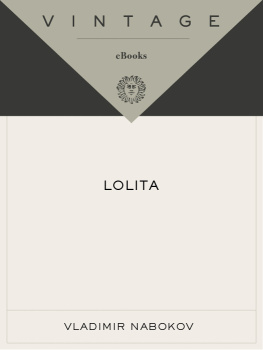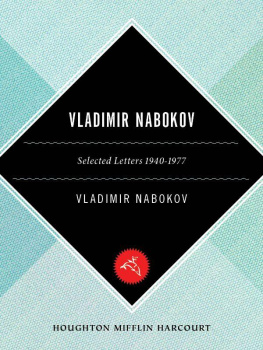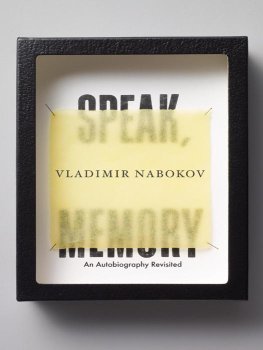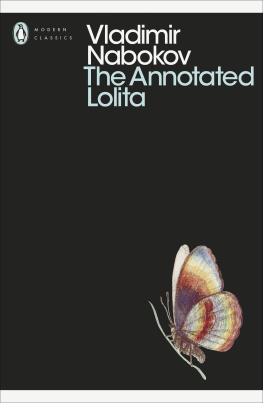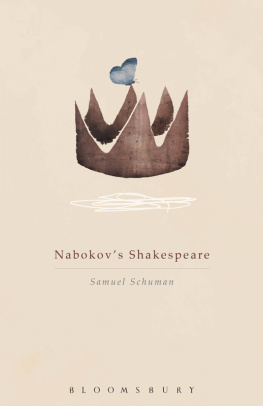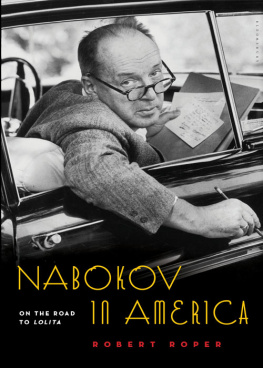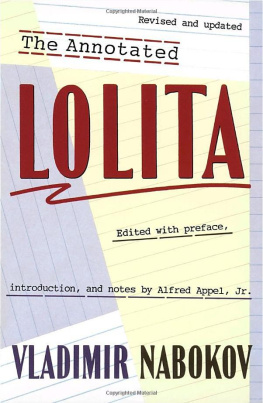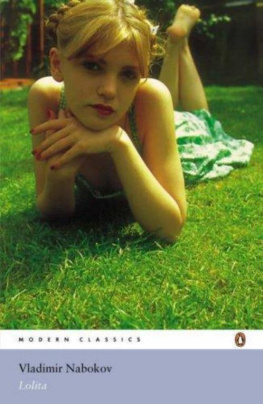Vladīmir Vladimirovich Nabokov - Lolita
Here you can read online Vladīmir Vladimirovich Nabokov - Lolita full text of the book (entire story) in english for free. Download pdf and epub, get meaning, cover and reviews about this ebook. year: 2010, publisher: Vintage, genre: Non-fiction. Description of the work, (preface) as well as reviews are available. Best literature library LitArk.com created for fans of good reading and offers a wide selection of genres:
Romance novel
Science fiction
Adventure
Detective
Science
History
Home and family
Prose
Art
Politics
Computer
Non-fiction
Religion
Business
Children
Humor
Choose a favorite category and find really read worthwhile books. Enjoy immersion in the world of imagination, feel the emotions of the characters or learn something new for yourself, make an fascinating discovery.
- Book:Lolita
- Author:
- Publisher:Vintage
- Genre:
- Year:2010
- Rating:4 / 5
- Favourites:Add to favourites
- Your mark:
- 80
- 1
- 2
- 3
- 4
- 5
Lolita: summary, description and annotation
We offer to read an annotation, description, summary or preface (depends on what the author of the book "Lolita" wrote himself). If you haven't found the necessary information about the book — write in the comments, we will try to find it.
Lolita — read online for free the complete book (whole text) full work
Below is the text of the book, divided by pages. System saving the place of the last page read, allows you to conveniently read the book "Lolita" online for free, without having to search again every time where you left off. Put a bookmark, and you can go to the page where you finished reading at any time.
Font size:
Interval:
Bookmark:
Published in 1955, Lolita became an instant sensation, establishing Vladimir Nabokovs reputation as one of the great prose stylists of the twentieth century. It is an unforgettable and immaculate masterpiece on obsession.
Humbert Humbert, erstwhile college professor, aesthete and tortured romantic is a self-professed nympholept. Lolita is the impossibly funny and rapturously beautiful story of Humberts total, catastrophic obsession with twelve-year-old Dolores Lolita Haze. At once prim and predatory, Humbert will stop at nothing in his frenzy to possess his nymphet, first marrying her mother and then embarking with Lolita on a journey across the American landscape, through roadside diners and five-dollar-a-night motels.
Brimming with gloriously flamboyant word play, Lolita displays the unparalleled prose style of a master of the English language in a story that also emerges as a transcendent satire on American consumerism.
Shockingly tender and beautiful, Lolita is suffused with an incandescent wit, sensual detail and articulations of longing and lust that are at once exquisite and grotesque.
ON A BOOK ENTITLED LOLITA
After doing my impersonation of suave John Ray, the character in Lolita who pens the Foreword, any comments coming straight from me may strike onemay strike me, in factas an impersonation of Vladimir Nabokov talking about his own book. A few points, however, have to be discussed; and the autobiographic device may induce mimic and model to blend.
Teachers of Literature are apt to think up such problems as What is the authors purpose? or still worse What is the guy trying to say? Now, I happen to be the kind of author who in starting to work on a book has no other purpose than to get rid of that book and who, when asked to explain its origin and growth, has to rely on such ancient terms as Interreaction of Inspiration and Combinationwhich, I admit, sounds like a conjurer explaining one trick by performing another.
The first little throb of Lolita went through me late in 1939 or early in 1940, in Paris, at a time when I was laid up with a severe attack of intercostal neuralgia. As far as I can recall, the initial shiver of inspiration was somehow prompted by a newspaper story about an ape in the Jardin des Plantes, who, after months of coaxing by a scientist, produced the first drawing ever charcoaled by an animal: this sketch showed the bars of the poor creatures cage. The impulse I record had no textual connection with the ensuing train of thought, which resulted, however, in a prototype of my present novel, a short story some thirty pages long. I wrote it in Russian, the language in which I had been writing novels since 1924 (the best of these are not translated into English, and all are prohibited for political reasons in Russia). The man was a Central European, the anonymous nymphet was French, and the loci were Paris and Provence. I had him marry the little girls sick mother who soon died, and after a thwarted attempt to take advantage of the orphan in a hotel room, Arthur (for that was his name) threw himself under the wheels of a truck. I read the story one blue-papered wartime night to a group of friendsMark Aldanov, two social revolutionaries, and a woman doctor; but I was not pleased with the thing and destroyed it sometime after moving to America in 1940.
Around 1949, in Ithaca, upstate New York, the throbbing, which had never quite ceased, began to plague me again. Combination joined inspiration with fresh zest and involved me in a new treatment of the theme, this time in Englishthe language of my first governess in St. Petersburg, circa 1903, a Miss Rachel Home. The nymphet, now with a dash of Irish blood, was really much the same lass, and the basic marrying-her-mother idea also subsisted; but otherwise the thing was new and had grown in secret the claws and wings of a novel.
The book developed slowly, with many interruptions and asides. It had taken me some forty years to invent Russia and Western Europe, and now I was faced by the task of inventing America. The obtaining of such local ingredients as would allow me to inject a modicum of average reality (one of the few words which mean nothing without quotes) into the brew of individual fancy, proved at fifty a much more difficult process than it had been in the Europe of my youth when receptiveness and retention were at their automatic best. Other books intervened. Once or twice I was on the point of burning the unfinished draft and had carried my Juanita Dark as far as the shadow of the leaning incinerator on the innocent lawn, when I was stopped by the thought that the ghost of the destroyed book would haunt my files for the rest of my life.
Every summer my wife and I go butterfly hunting. The specimens are deposited at scientific institutions, such as the Museum of Comparative Zoology at Harvard or the Cornell University collection. The locality labels pinned under these butterflies will be a boon to some twenty-first-century scholar with a taste for recondite biography. It was at such of our headquarters as Telluride, Colorado; Afton, Wyoming; Portal, Arizona; and Ashland, Oregon, that Lolita was energetically resumed in the evenings or on cloudy days. I finished copying the thing out in longhand in the spring of 1954, and at once began casting around for a publisher.
At first, on the advice of a wary old friend, I was meek enough to stipulate that the book be brought out anonymously. I doubt that I shall ever regret that soon afterwards, realizing how likely a mask was to betray my own cause, I decided to sign Lolita. The four American publishers, W, X, Y, Z, who in turn were offered the typescript and had their readers glance at it, were shocked by Lolita to a degree that even my wary old friend F.P. had not expected.
While it is true that in ancient Europe, and well into the eighteenth century (obvious examples come from France), deliberate lewdness was not inconsistent with flashes of comedy, or vigorous satire, or even the verve of a fine poet in a wanton mood, it is also true that in modern times the term pornography connotes mediocrity, commercialism, and certain strict rules of narration. Obscenity must be mated with banality because every kind of aesthetic enjoyment has to be entirely replaced by simple sexual stimulation which demands the traditional word for direct action upon the patient. Old rigid rules must be followed by the pornographer in order to have his patient feel the same security of satisfaction as, for example, fans of detective stories feelstories where, if you do not watch out, the real murderer may turn out to be, to the fans disgust, artistic originality (who for instance would want a detective story without a single dialogue in it?). Thus, in pornographic novels, action has to be limited to the copulation of clichs. Style, structure, imagery should never distract the reader from his tepid lust. The novel must consist of an alternation of sexual scenes. The passages in between must be reduced to sutures of sense, logical bridges of the simplest design, brief expositions and explanations, which the reader will probably skip but must know they exist in order not to feel cheated (a mentality stemming from the routine of true fairy tales in childhood). Moreover, the sexual scenes in the book must follow a crescendo line, with new variations, new combinations, new sexes, and a steady increase in the number of participants (in a Sade play they call the gardener in), and therefore the end of the book must be more replete with lewd lore than the first chapters.
Certain techniques in the beginning of Lolita (Humberts Journal, for example) misled some of my first readers into assuming that this was going to be a lewd book. They expected the rising succession of erotic scenes; when these stopped, the readers stopped, too, and felt bored and let down. This, I suspect, is one of the reasons why not all the four firms read the typescript to the end. Whether they found it pornographic or not did not interest me. Their refusal to buy the book was based not on my treatment of the theme but on the theme itself, for there are at least three themes which are utterly taboo as far as most American publishers are concerned. The two others are: a Negro-White marriage which is a complete and glorious success resulting in lots of children and grandchildren; and the total atheist who lives a happy and useful life, and dies in his sleep at the age of 106.
Next pageFont size:
Interval:
Bookmark:
Similar books «Lolita»
Look at similar books to Lolita. We have selected literature similar in name and meaning in the hope of providing readers with more options to find new, interesting, not yet read works.
Discussion, reviews of the book Lolita and just readers' own opinions. Leave your comments, write what you think about the work, its meaning or the main characters. Specify what exactly you liked and what you didn't like, and why you think so.

